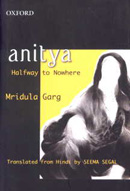
If you have ever had the the niggling feeling that there is something swimming under your feet in a lake, only to look underwater to see an enormous fish keeping its eye on you, you'll understand the feeling I kept having while reading Anitya, Halfway to Nowhere. I couldn't shake the sense that there was an allegory at work and that although the characters were real enough, with believable dialogue and actions, they were in fact something more, perhaps India itself. Set in the 50s of post-independence India, this doesn't make Anitya inaccessible, however. Rather, Garg's tale increases our understanding of a country which has achieved its centuries long dream of independence, only to find itself not quite knowing what to do having arrived.
The book is very political, with the author even inserting herself into the script:
For once Avijit had no argument.
'Not only did he not raise his voice against the tyranny in the jails but, by raising the spectre of violence versus non-violence, created public indifference to repression. Whenever the question of freeing political prisoners arose, he made an unnecessary distinction between violent and non-violent fighters. History will never forgive him for that double standard.'
But is history itself not written with double standards? Who writes history? Those who manage to seize power and once in power, they soon become adept in the practice of double standards.
It was enlightening to realise that Indians might not share the Western near-reverence for Gandhi. He might have been the man of the hour but as Garg presents him, he badly skewed that hour and she skewers him for it throughout the novel.
Although Avijit is the main character, he shares star billing with his brother, Anitya, after whom the novel has been named. As Garg explains in her Author's Note, she did so because he is "the alter-ego of Avijit but also the underlying concept of the novel. He has seen it all; he has no illusions but he is a wayfarer not a mendicant. He does not want to give up the world, and laughs at others and himself so that we might yet awaken to a better world some day."
Avijit has lived through the harsh breaking away from English rule as a quasi revolutionary, although he is no hero but a weak and not particularly honest man who has made most of his choices in life from those qualities. He has come through cataclysmic events relatively unscathed and now enjoys a solidly middle class life, with money and comfort. But his past, with its choices, haunts him.
At the point where we enter the story, his beautiful wife, Shyama (who he married for any reason but love), has become a hypochondriacal invalid, using illness to hold his wandering attention. He appears to love his two oldest daughters, the budding actress Shubha and the fiery revolutionary Prabha, but doesn't even get the name of his youngest daughter right half the time (Khokhee) and treats his mentally handicapped son Sudhanshu with appalling neglect. Through a series of flashbacks in the first part of the novel, we see Avijit make certain choices about situations, friendships and relationships. It isn't until the second part of the novel that we understand fully the impact of the choices he has made, with his moral deterioration symbolically matched by a physical one. We see then what Garg would have us understand about the power of choice.
Anitya, Halfway to Nowhere isn't a historical novel per se but history is what its characters have lived,
what has shaped them, what continues to shape their children. It isn't a happy story and as it pertains to
the characters, it isn't a particularly hopeful one. It is a story about precisely what it says it is: a
man, a nation, halfway to nowhere. But this reader found it an interesting tale, its characters fascinating.
Garg shows us what might have been, what independence didn't achieve but could have, what Avijit could have
become had he made different choices. Nor is the story entirely devoid of hope. Through the characters of
Prabha and Shubha, with their high principles and moral astuteness, there is the sense that an India of the
future might be something different if only its people can choose well. Choice, as Garg writes it, is
everything.

Oxford University Press, hardcover, 9780198065258
